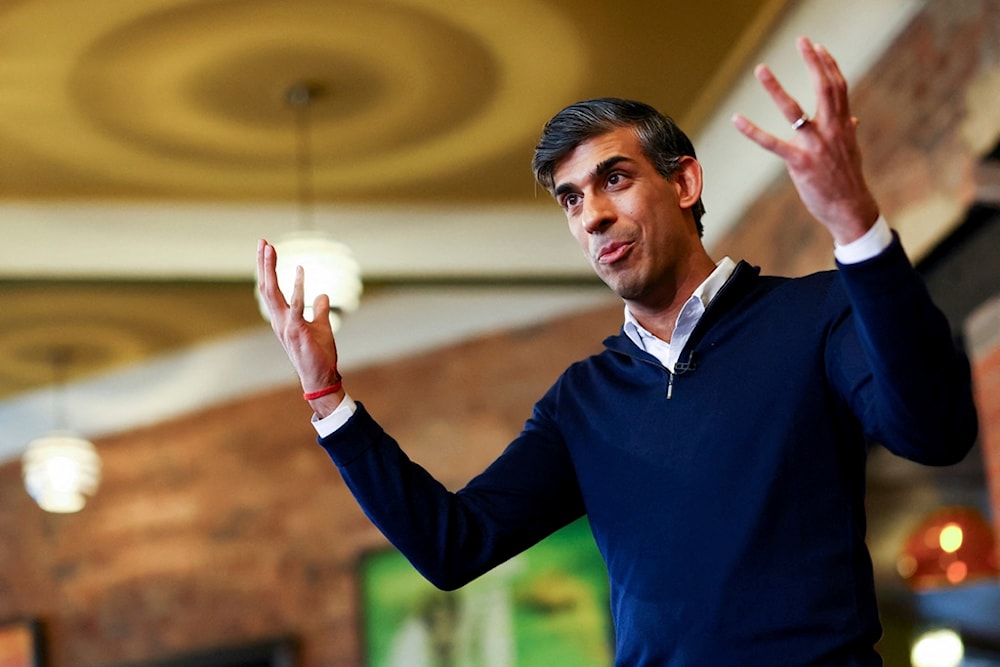Amid UK's inflation crisis, Rishi Sunak accepts a 5.5% salary raise
Members of the British parliament have all accepted the significant raise in salaries, recommended by Independent Parliamentary Standards Authority.
-

British Prime Minister Rishi Sunak attends a Q&A at The Queens Hotel, a JD Wetherspoon pub in Maltby, England, Thursday, March 7, 2024. (AP)
In a controversial new move, reports have surfaced that UK Prime Minister Rishi Sunak has accepted a 5.5% salary raise.
The raise surpasses the rate of consumer price inflation, which stood at 4% in January, as well as last year's 2.9% salary raise.
This comes amid the Independent Parliamentary Standards Authority's recommendation to increase the salaries of the members of parliament from an already whopping £86,584 to £91,346. When asked if Sunak would accept the raise, his spokesperson confirmed and said all members alike would receive it.
However, the spokesperson also revealed that the ministers rejected another raise to their ministerial salaries, a separate income.
“For the government’s part, I would point out that ministers are already voluntarily waiving part of their salaries, forgoing any pay increase to their ministerial salaries, which means that salaries of ministers in the Commons have not increased since 2010,” No 10 reported.
Read more: British citizens welcome 2024 with 5% hike in energy bills
Breakdown of Sunak's earnings
In 2022-2023, when Rishi Sunak first took office, he accepted £75,440 of his £80,807 salary, atop the separate salary he is granted for being an MP.
Government records from the same year revealed that Sunak's taxable income exceeded £2.2 million, resulting in over £500,000 in tax payments. His earnings included £1.8 million in capital gains, up from £1.6 million the previous year, and £290,000 in other interest and dividends. Notably, all investment income and capital gains originated from a blind trust in a US-based investment fund, as reported by No 10.
The sum of £139,477 received from his roles as MP and Prime Minister accounted for 7% of Sunak's total income, which has amounted to approximately £7 million over the past four years.
It is worth noting that Sunak and his wife, who is the daughter and inheritor of the billionaire co-founder of the Indian IT company Infosys have a joint net wealth of over £500 million, making the PM part of the wealthy class that often gets criticized as "out of touch".
In this context, the Ipsa chair, Richard Lloyd, said: “Serving as an MP should not be reserved to those wealthy enough to fund it themselves. We believe our decision recognizes the vital role MPs play in our democracy and considers the continued economic challenges facing the country.
“We are committed to supporting a parliament that reflects our society, where people from all walks of life can decide to become MPs.”
Read more: UK businesses turn to overseas recruitment amidst worker shortage
Inflation, growth, and business
While Sunak accepts more monetary benefits and accumulates an even higher wealth, the UK's economy slipped into a recession.
During the last quarter of 2023, the UK's gross domestic product reached an unexpected and worse-than-predicted 0.3% contraction, compared to the forecasted 0.1% economists calculated in a poll by Reuters, as well as the 0.1% shrinkage witnessed in the previous quarter. This signifies the lowest drop in the UK since Covid-19 hit the global economy.
Reportedly, this is because of the manufacturing, construction, and wholesale sectors.
GDP per person in the UK, on the other hand, has not seen any growth since 2022, indicating the longest stagnance in over four decades.
At the same time, the country's inflation index stood at 4%, which was lower than the forecasted sum. However, the Bank of England remains anxious because of the constant growth in wages, in the face of tax cuts.
Read more: The UK is now a poor nation, poorer than the US: Report

 4 Min Read
4 Min Read








